|
 Before
sharing his presentation, Keller gave an update on the museum. When
Lincoln College closed in May 2022, Keller said the board of
trustees committed themselves to keeping the museum open. He said
they know the museum is very crucial to the Lincoln scholarship
world, the community, and the economy of the community. Before
sharing his presentation, Keller gave an update on the museum. When
Lincoln College closed in May 2022, Keller said the board of
trustees committed themselves to keeping the museum open. He said
they know the museum is very crucial to the Lincoln scholarship
world, the community, and the economy of the community.
The museum is also important to national and international visitors.
Every week, Keller said people from all over the world come to visit
the Lincoln Heritage Museum. Just last week, he said there were
visitors from the Netherlands, England, Australia, New Zealand,
Germany and Spain. People from around 20 to 30 states visit too and
Keller said they would not be stopping in Lincoln if it were not for
the museum.
Keller is proud of what the museum has been and where it will go in
the future. The college is funding the museum and Keller’s salary.
He is hoping the museum will be able to stay open as long as
possible.

Next, Keller discussed some items in the museum
collection connected to Logan County. The collection is
predominantly Abraham Lincoln related and there are a lot of unique
Abraham Lincoln items.
What Keller wanted to focus on for his presentation was the Logan
County history in the museum. Many were items Keller said some
people may not know about.
If there was something that piqued people’s interest and they wanted
to research it, Keller said to let him know. The vault in the museum
is always open for people to come in and do research. The museum is
a “laboratory” for people to learn more about history.
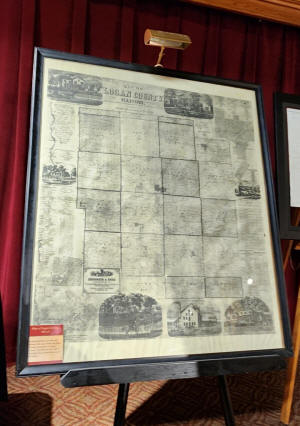
Among the many items in the museum Keller marvels,
there are also “puzzles” or mysteries he wants to uncover. He is
looking for people to fill in missing gaps in information needed and
would love to have more volunteers.

The “show and tell” Keller did included a large map
of Logan County from 1863 or 1864 during the Civil War. It has the
business directory of Lincoln including some elected officials, so
Keller went through Logan County records to find out who was in
office at these periods. The map lists the towns and the plats of
the town at the time. One person said LCGHS has a copy of this map.
When Sally Turner was Logan County Clerk and Recorder, Keller said
she gave the museum some old county records. These records had been
stored in the basement of the courthouse and Turner felt
uncomfortable having these items stuffed in boxes in a damp,
non-climate-controlled area.
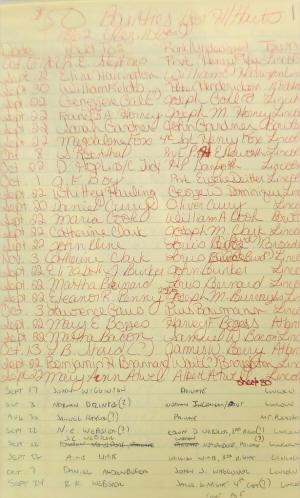
In the years since the museum got the records, Keller
said they have been catalogued. The records go all the way back to
1863 and include pay stubs and records for Logan County soldiers
with lists of their names, dates and pay rates. If anyone wants to
look up ancestors, Keller said they find their names in these
records.
Other records included stray records of lost cattle, horses and
sheep from 1870 to the 1890s. Keller said when a student did some
research on stray records, the student wondered why so many animals
were lost. Since people did not have vehicles, these animals were
their mainstays. Keller said some people had to sue to get their
animals back.

Polling and election records from the 1870s to 1890s
are another collection the museum received. Keller said there are
names attached to these records.
All the records are in hard copy and saved on a floppy disk.
Unfortunately, Keller does not have a way to open a floppy disk.
Keller hopes to enter them into digital records at some point.
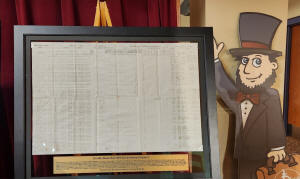
One large document given to the museum by Joe and
Sudle Mintjal is a Civil War Muster Roll for the 106th Illinois
Infantry Company F for the period from February 28 to April 30,1863.
This regiment fought in many battles including the Battle of
Vicksburg. They were mustered out of service in July 1865 and
discharged from Camp Butler, Illinois on July 24, 1865.
The oldest item Keller said the museum has is an 1822 ferry license
for Erastus Wright to operate his ferry in Peoria. Wright was a
Logan County resident and Keller believes he was the first teacher
in the county.
One LCGHS member said Wright moved here from Connecticut in 1821. He
taught on Elkhart Hill.
Road petitions from Salt Creek and other places provide a history of
the first roads built in the county. Keller said one 1824 road
petition relates to a road from Lincoln to Elkhart,

Keller said there are six boxes of an Ed Madigan
collection. Madigan grew up in Lincoln and graduated from Lincoln
Junior College before he started his own taxicab business.
Madigan served as a member of the Lincoln Board of Zoning Appeals
from 1965 to 1969 and was elected to the Illinois House of
Representatives in 1967, serving in that role until 1973. He was
elected to the U.S. House of Representatives in 1972 and served nine
terms. From 1991 to 1993, Madigan served as Secretary of
Agriculture.
There are plaques, awards, photos, and other items in the Ed Madigan
collection. Keller said no one here has done research on Madigan, so
if anyone is looking for information on him, he could help.
Several records in the museum include Civil War letters. Keller said
there are many letters from Joseph Ross, a medical surgeon who
served during the Civil War. Following the Civil War, Ross moved to
Logan County. In 1866, Ross helped organize Lincoln’s First
Presbyterian Church and the county’s first Medical Society. In 1869,
Ross was elected as a city alderman, serving several terms. He was
later elected to the Illinois House of State Representatives.
Though Keller has never been able to find a photograph of Ross, he
has contacted Illinois State Archivist Dave Jones. Jones thinks he
may have a photo of Ross. Keller said Ross may go from mystery to
marvel if he gets a photograph.
Through reading a book about medical surgeons, Keller
discovered surgeons were the least likely to write letters because
of the horrific and graphic things they dealt with. In addition,
they were often too busy to write letters. Keller is fascinated by
Ross’s letters, which do not talk about the weather or the battles
or provide news from the front like many soldier’s letters do.
[to top of second column] |

Some of Ross’s letters were read aloud by Keller. In
these letters Ross chides his wife for not writing him often enough.
For example, in one letter, Ross says “you say you have written
seven times and I have received only five [letters].” Ross listed
the dates he had written his wife and told her he would be better
pleased if she would write “oftener.”
In another letter, Ross said some in his unit got letters every
week. A letter Ross started with “my dear little wife” told her he
envied her getting three or four letters a week from him. Meanwhile,
Ross said he had to wait a whole month to get a letter from her.
Ross tells his wife he is not scolding her but is begging her and
entreating her to write “oftener.”
Because Ross was a medical surgeon during the war, he saw some
horrible wounds. Keller finds the detail Ross went into a December
11, 1863, letter from Prairie Grove, Arkansas interesting.
In the letter, Ross said he does not like to see
people butchered up, but when it is necessary to cut, he would
rather do it than not. Ross does not want to give a long description
of the horrid nature of wounds he has seen so as not to shock her
sensibilities. However, Ross said he had seen wounds of every
conceivable nature: legs shot off, faces shot off and bodies
disemboweled. Ross had seen more dead than he had ever seen in his
life.
A July 4,1863, letter Ross wrote about the Battle of Vicksburg
showed he understood how important the battle was. Ross said his
heart was full and he could scarcely talk about anything else. He
felt it was one of the greatest fourth of July’s in the country and
felt confident about his side’s victory.

After seeing the first regiment of “colored” troops
he had ever seen in Memphis, Ross wrote to his wife that it looked
odd but great to see their black faces peeking out in federal
uniform. Ross said they presented a fine appearance and looked like
real soldiers.
The site of those fellows armed for their families and country was
evidence to Ross that “God is on our side.” In his letter dated June
11, 1863, Ross said these people still needed justice done to them
in full. They had yet to be recognized and treated as human beings
and brothers possessing the rights to personal and political
freedom.
From reading the view Ross expressed in this letter, Keller found
Ross to be very equalitarian. Ross viewed racism and slavery as an
ugly sin the nation was guilty of, feeling the nation was suffering
the punishments and vengeance of heaven as a result.
Because Keller is still researching Joseph Ross’s life, he is not
sure if he practiced medicine in the county as someone asked.
Someone else pointed out that since Ross started a medical society
here, it seems likely he did practice medicine in the county.
Abraham Lincoln owned a “lot” of land on the square until the day he
died. Keller said Lincoln acquired the land from Primm. After
Lincoln died, the land was bequeathed to his family. Keller said the
Logan County Treasurer John Jenkins received a letter from Judge
David Davis asking that the taxes on the lot be removed on behalf of
Lincoln’s family.
Davis was a Supreme Court Justice by that time, so Keller said he
had a lot of pull. Jenkins wrote Judge Davis back and said the taxes
would be forgiven and the Lincoln family had nothing to worry about.

A funeral train schedule for Abraham Lincoln is
another part of the museum collection. This schedule lists all the
places where the funeral train stopped including Atlanta, Lincoln,
and other places in the area.
Several years ago, Lincoln College graduate David Shroyer gave the
college glass negatives from local photographer Walter Tandy. Tandy
was a photographer in the area from the 1870s to the early part of
the 20th century. Some of the glass negatives are also at Lincoln
Public Library.
Former Lincoln College student David Doolin has scanned all 130
glass negatives.
About one third of the negatives have been developed and blown up.
Keller said he and others have been able to identify who or what is
in some of them.
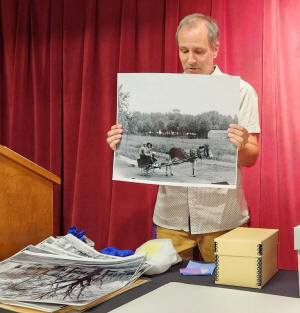
The fifteen photos Keller showed everyone included
ones of the old Adams School, Jefferson School, Madison School, and
the three sister’s houses. Other photos show Elkhart Bridge and the
old power plant south of town.
Photos of people included local teacher Herbert Merry, an
unidentified African American man, a man and boy, and several
children. One has people in a horse drawn wagon with Lincoln
College’s University Hall in the background.
A photo album Keller bought online has photos of the first Lincoln
College President Anzo Freeman taken at Albert’s Studio. The album
also contains photos of many other people and the Lizzie Freeman
house. Keller would like to find out where that house is.
When someone asked Keller about the album, he said he bought the
album because it had once belonged to Freeman.
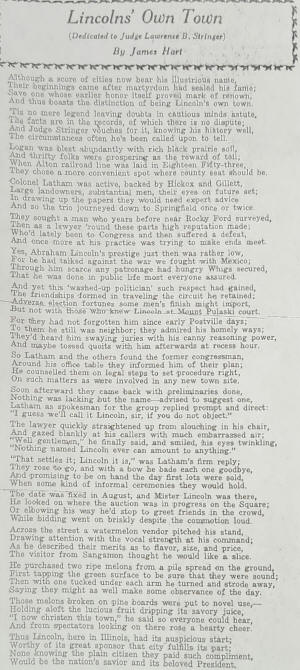
Writings in the museum collection now include two
poems by James Hart, a student or protégé of Judge Lawrence
Stringer. Keller handed out copies of these long poems. One is
titled “Lincoln’s Last Journey” and talks about Lincoln’s body
travelling to its burial site in Springfield. The other one is
“Lincoln’s Own Town,” which Keller said is about Lincoln, Illinois.
Most of the items Keller said the museum has are from Abraham
Lincoln and the Civil War era. To find out more about the history of
the county, Keller said people should visit the Logan County
Genealogical Society building on North Chicago Street. As Keller
said, both the museum and the historical society have a story to
tell.
The Lincoln Heritage Museum hours are Tuesdays through Fridays from
9-4 and Saturdays from 1 to 4. Keller said admission is one dollar.

After Keller’s presentation, he left several items
out for people to look at more closely.
The next Logan County Genealogical and Historical Society meeting
will be Monday, October 18 at 6:30 p.m. at their building at 114 N.
Chicago Street. LCGHS president Bill Donath will be on the 1883 Zora
Burns murder, which happened in Lincoln.
[Angela Reiners]
 |